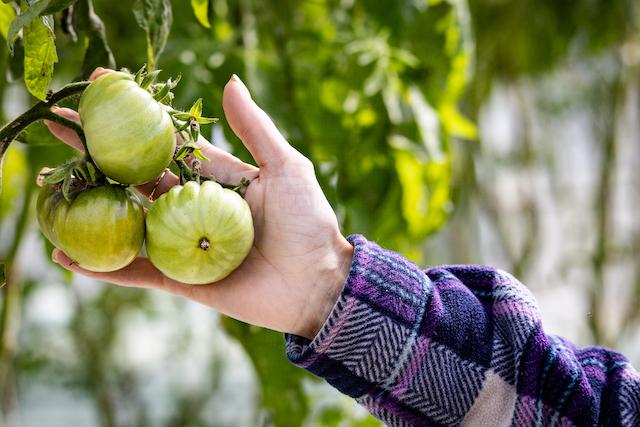After a decade in the Army, including three years in Iraq and Afghanistan, Seth Anderson felt lost. He had enlisted straight out of high school, and he didn’t know what to do with his life post-combat.
“I needed a way to reconnect and serve—and fight my own demons and get them under control,” he said. Then, he heard about Archi’s Institute for Sustainable Agriculture (AiSA). Run by a Marine veteran and his wife in Escondido, California, the educational program promised to train service men and women transitioning out of the military to be successful entrepreneurs in the sustainable agriculture industry. Mr. Anderson, who had gotten into gardening as a hobby while on active duty, was intrigued.
In February 2016, a few months after he was medically retired from the Army, he packed up his Subaru and a little trailer, left his wife and 10-month-old son at home in northern California, and drove down to Escondido to stay in a rented camp spot while attending the six-week program.
It was worth it. He graduated with a fully- fledged business plan for a start-up market garden, took it home to Janesville, and started operations the next month. By the month after that, he was selling at the local farmers market.
“My mission is, we sow, grow, and harvest in the community, for the community. That was at the heart,” Mr. Anderson said. In addition to his 1-acre urban farm growing and selling microgreens, salad greens, and root crops, he’s started a community garden, out of which formed a co-op that now manages both the garden and the local farmers market; added an education farm on a rented 1.5 acres, where he hosts workshops and grows other crops; works as a part-time gardening teacher at an elementary school; and is working to partner with local schools to deliver them local produce.

“He has absolutely rocked it,” said Karen Archipley, co-founder of AiSA with her husband, Colin. Stories like Mr. Anderson’s—just one of more than 750 graduates who have completed the program—are what keep her going. “We’re turning out farmers. People leave our place and they’re farming today, or they’re teaching farming, or they’re consulting about farming, and that means the world to me,” she said.
She’s passionate about its potential to transform local communities—and America as a whole. “Let’s take back our country. We can feed people. There’s no reason that we have to import all of our food,” she said. “Feed your community first. That’s our motivation: to reinvigorate the family farm, one family at a time, throughout America.”

Starting the Farm
Ms. Archipley is candid about the beginnings of the program: “We started this as a way that my husband didn’t reenlist,” she said. A decorated Marine sergeant, Mr. Archipley had returned from three deployments to Iraq, including to combat hotspots Fallujah and Haditha, with PTSD, traumatic brain injury, and “so many losses,” Ms. Archipley said.
But as the couple navigated his transition to civilian life, they found shockingly little support—including in finding a doctor who understood his combat-related injuries. Many of his friends, meanwhile, struggled to transition to a stable career and make a living. Others—too many—were lost to suicide.

Fortunately, the Archipleys had a plan. Between Mr. Archipley’s second and third tours, they’d gotten married and bought a 2.5-acre farm in Escondido close to Camp Pendleton, the Marine Corps base. They were both passionate about living an organic lifestyle, and they saw a future in farming.
Then they saw their first month’s water bill: $850. That was when the couple decided there had to be a more sustainable way to grow.
Ms. Archipley pored over books, sending them to her husband as part of his care packages, and learned about hydroponics, a system of growing plants in a water-based nutrient solution instead of soil. Since the plants only take as much water as they need, “we use up to 90 percent less water,” Ms. Archipley explained. The crop yield also multiplied, with leafy greens growing three to five times and tomatoes growing eight to 10 times. When Mr. Archipley came home in 2006, they built their first 30-by-60-foot greenhouse and established Archi’s Acres, an organic hydroponic farm selling basil and other crops to local markets.
The process allowed Mr. Archipley to heal. The couple decided to set up a school to teach others what they’d learned. “The school … has been [the reason] why we get up in the morning,” Ms. Archipley said.
They drew upon their lived experience to develop the course, including the ups and the downs. Ms. Archipley recalled that right as they undertook a major expansion in 2016, to add a third, 28,000-square-foot greenhouse, a contract with a major buyer fell through. They almost lost everything. But, she said, “Who better than us for something like that to happen to? Because we can share our experience, strength, and hope, and say, ‘There’s light at the other end of that tunnel. Don’t give up.’”

An Agribusiness Boot Camp
AiSA offers six-week courses and 12-week nights-and-weekends courses, in partnership with the University of Minnesota Crookston, covering topics from seed propagation and irrigation to doing market analyses and writing financials for a business plan. The classes are also open to non-veterans.
“The whole idea is that when they come in, we expect them to know nothing about farming or starting a farm,” said Tony Lattner, director of education since 2013. “When they leave here, their plan is complete enough for them to get funding. They have a foundation to start their business.” Mr. Lattner, a Marine veteran with a teaching background, took the course before joining AiSA’s team.

At the end of the program, graduates leave with 16 credits of college coursework, a certificate of completion in sustainable agriculture, and certification in hydroponics and food safety.
Equivalent to a 3-unit college course every week, the work is intense: “We tell them it’s basically trying to drink out of a fire hose,” Mr. Lattner said. But he’s noticed that veterans are quick to jump in and help out anyone who’s struggling. “Students don’t let each other fail the course,” he said, describing the bonding experience as similar to being in the military. It’s a unique environment, which he thinks is part of what makes the program work: “[It’s] a room full of vets and you all speak the same language, have been through the same type of experiences. You’re in a room where you feel like you know everybody already.”

Beyond the Classroom
The support continues after graduation. Graduates are eligible to apply for the USDA Farm Service Agency’s Beginning Farmer loan. AiSA partners with several companies that offer discounts to graduates, from a web hosting service to a greenhouse manufacturer. If the couple hears of someone in a different state looking for, say, a produce supplier, “we’ll find a student there and connect them,” Ms. Archipley said. An alumni Facebook group serves as a hub to share experiences, job posts, equipment for sale, and more.
Mr. Lattner estimates that more than 200 AiSA graduates have started farms of their own. Other ventures include a butcher shop in Kentucky, a coffee business in North Carolina, and a chain of empanadas restaurants in San Diego. Graduates are spread as far afield as Alaska, Puerto Rico, and Japan.
They make Ms. Archipley proud. “It makes me incredibly proud when I see their business plans roll out,” she said. “We get to make a difference in all those lives, and that matters to me.”
For Mr. Anderson, the northern California farmer, “the community aspect has been the biggest thing,” he said. “It’s really a blessing. I never really thought I would be talking to people, trying to connect again.” He is most proud of being able to teach kids about “a little thing like microgreens,” he said. He often gets recognized at the market or grocery store by students who remember what he taught them. (“Hey, it’s Farmer Seth!”) His two young sons have told him they want to be farmers when they grow up. They tell him they were inspired by their father. “Seeing the little ripple effects of the pebble in the water, … it’s given me a new task and purpose,” he said.
He brings it back to what drew him to gardening in the first place: the mystery and simplicity of being able to see new life emerge. “It’s planting a seed, and not knowing what it’s going to grow into.”
This article was originally published in American Essence magazine.






